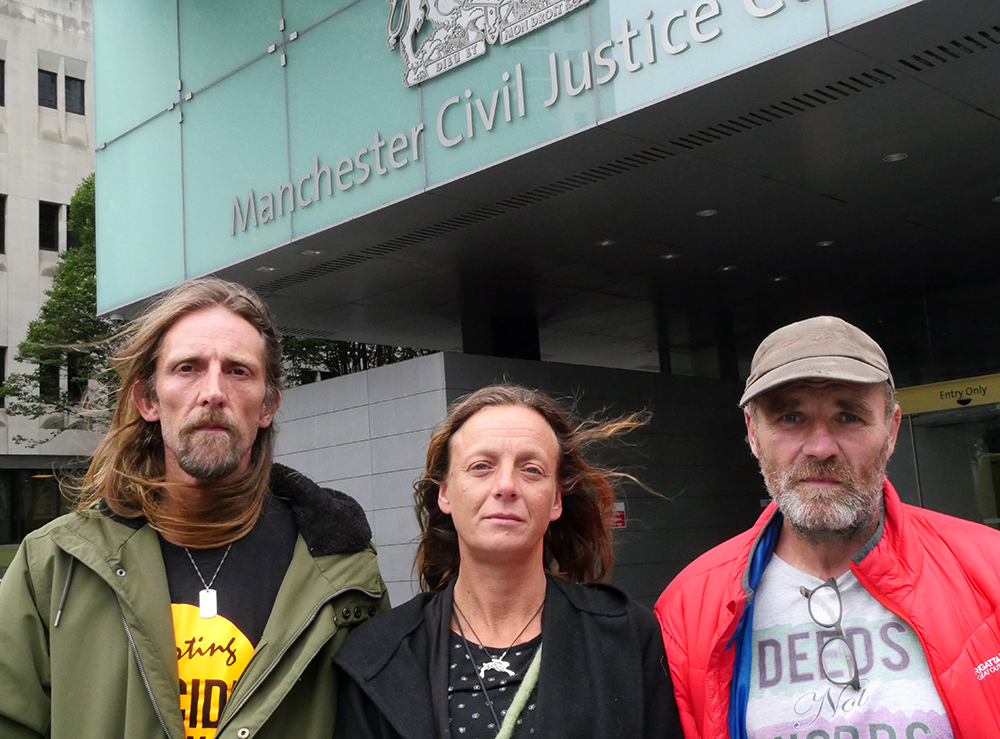Three environmentalists found guilty of breaching a protest ban at the site of the UK’s “biggest” fracking tremor have lost their bid to have their sentences quashed.
Katrina Lawrie, Christoper Wilson and Lee Walsh now face having to pay more than £70,000 in legal fees after the Court of Appeal ruled against them on Thursday (23 January).
The trio were given suspended jail sentences last year for flouting an injunction restricting protest at energy firm Cuadrilla’s shale gas site, near Blackpool.
The anti-fracking protesters’ legal team had argued that the wording of the order was too “unclear and uncertain” and so they should not have been brought before the courts and punished for a possible breach.
Appeal court judges rejected this argument this morning, ruling that the trio were in contempt of court.
But the longer suspended prison sentence imposed on Lawrie, for a separate incident, was reduced from two months to four weeks.
The High Court had previously ordered the protesters to cover Cuadrilla’s costs – which stood at £70,000 at the time of the Court of Appeal proceedings. The true figure is likely to now be higher.
Robert Lizar Solicitor, who represented the protesters, has said it will appeal these costs arguing they breach their clients’ “human right to a fair trial and access to the courts” .
In a statement, it said: “There is a huge disparity between the resources of protesters and large corporations obtaining these kind of anti-protest injunctions – particularly as legal aid is not generally available to challenge the injunctions themselves.”
The case dates back to 24 July 2018 when Wilson, Lawrie, and Walsh, took part in a “lock-on” protest at the site.
With their arms fastened together inside tubes, they blocked traffic going in and out of the shale gas site near Blackpool in Lancashire for around six-and-a-half hours.
At a trial in Manchester in August last year, Wilson and Walsh were sentenced to four weeks in prison suspended for two years.
While Lawrie was sentenced to an additional two months in prison suspended for two years for a separate alleged breach. She ran into Preston New Road in August 2018, causing a lorry to swerve out of the way.
Days before the sentencing hearing, Cuadrilla’s shale gas site experienced what is believed to be the UK’s largest ever fracking-related tremor.
In November, the government halted fracking in England in a major U-turn.
It came after a study by the Oil and Gas Authority warned that it was not possible to rule out “unacceptable” consequences for those living near fracking sites.
After fracking was halted indefinitely, Cuadrilla agreed to remove some of the restrictions from its injunction that had been opposed by the campaigners and their legal team.
These restrictions banned “persons unknown” from blocking the entrance of the site with “a view to slowing down and stopping traffic” and as well as “causing inconvenience and delay,” among other things.
At last month’s Court of Appeal hearing, barrister Kirsty Brimelow QC said that Judge Pelling QC had made an error in finding her clients in contempt of court.
This was because the wording of the injunction was “insufficiently clear and certain”.
She also argued that it was “inappropriate or manifestly excessive” to impose a suspended sentence on peaceful protesters. Brimelow highlighted that people convicted in protest cases are often given conditional discharges.
In a 30-page judgment, Lord Justice Leggatt dismissed the argument that the injunction was not clear enough, saying that there was “well-documented” history of attempts to obstruct the entrance of the site. This “clearly infringed the claimants’ rights of free passage,” he added.
“There is no principle which justifies treating the conscientious motives of a protestor as a licence to flout court orders with impunity from imprisonment, whatever the nature or extent of the harm intended or caused provided only that no violence is used,” the judgement continued.
But he added that there are at least three reasons for showing “greater clemency” in response to acts of civil disobedience.
This includes the “moral difference” between a person who engages in civil disobedience compared to the “ordinary law-breaker”; that they are typically law-abiding citizens, and that the courts can engage in more “effective” dialogue with defendants when they show restraint.
He deemed that Wilson and Walsh’s suspended sentences were not “wrong in principle”.
But on Lawrie’s sentence, for her additional breaches, he said: “In my judgment, although the judge was right to conclude that the custody threshold was crossed, the appropriate penalty for this contempt of court was the same as that imposed for the earlier contempt committed by all three appellants – that is, a suspended term of imprisonment of four weeks.”
Barrister Adam Wagner, EachOther’s chair and founder, is acting in this case. He had no involvement in writing this article.







